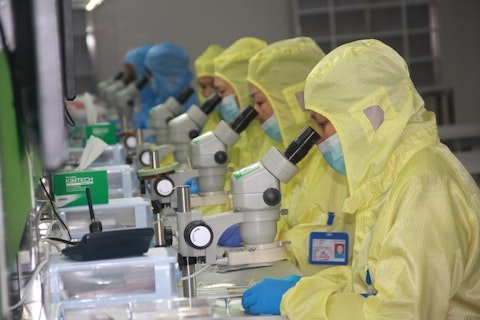MacroGenics, Inc. (NASDAQ:MGNX) Q1 2023 Earnings Call Transcript May 9, 2023
Operator: Good afternoon. We will begin the MacroGenics 2023 First Quarter Corporate Progress and Financial Results Conference Call in just a moment. All participants are in a listen only mode at the moment, and we will conduct the question-and-answer session at the conclusion of the call. At this point, I will turn the call over to Jim Karrels, Vice President, Chief Financial Officer of MacroGenics. Please go ahead.
Jim Karrels: Thank you, operator. Good afternoon. And welcome to MacroGenics conference call to discuss our first quarter 2023 financial and operational results. For anyone who’s not had the chance to review these results, we issued a press release this afternoon outlining today’s announcement, which is available under the Investors tab on our Web site at macrogenics.com. You may also listen to this conference call via webcast on our Web site, where it will be archived for 30 days beginning approximately two hours after the call is completed. I would like to alert listeners that today’s discussion will include statements about the company’s future expectations, plans, and prospects that constitute forward-looking statements for purposes of the safe harbor provision under the Private Securities Litigation Reform Act of 1995.
Actual results may differ materially from those indicated by these forward-looking statements as a result of various important factors, including those discussed in the Risk Factors section of our annual, quarterly and current reports filed with the SEC. In addition, any forward-looking statements represent our views only as of today and should not be relied upon as representing our views as of any subsequent date. While we may elect to update these forward-looking statements at some point in the future, we specifically disclaim any obligation to do so even if our views change, except to the extent required by applicable law. And now I’d like the turn call over to Dr. Scott Koenig, President and CEO of MacroGenics.
Scott Koenig: Thank you, Jim. I’d like to welcome everyone participating via conference call on webcast today. This afternoon, I will provide key updates on our clinical programs. But before I do so, let me first turn the call back to Jim, who will review our financial results.
Jim Karrels: Thank you, Scott. This afternoon, MacroGenics reported financial results for the quarter ended March 31, 2023, which highlight our financial position. As described in a release this afternoon, MacroGenics’s total revenue consisting primarily of revenue from collaborative agreements was $24.5 million for the quarter ended March 31, 2023 compared to total revenue of $11.1 million for the quarter ended March 31, 2022. Revenue for the quarter ended March 31, 2023 included recognition of the $15 million milestone received from Insight for the US FDA approval of ZYNYZ, $3.6 million in contract manufacturing revenue and MARGENZA net sales of $3.5 million compared to $3.6 million for the quarter ended March 31, 2022. Our research and development expenses were $45.9 million for the quarter ended March 31, 2023 compared to $61.4 million for the quarter ended March 31, 2022.
The decrease was primarily related to decreased vobramitamab duocarmazine development costs and decreased costs related to our discontinued studies. These decreases were partially offset by increased expenses related to discovery projects and preclinical molecules and increased clinical expenses related to lorigerlimab. Our selling, general and administrative expenses were $13.5 million for the quarter ended March 31, 2023 compared to $16.3 million for the quarter ended March 31, 2022. The decrease was primarily related to decreased legal and consulting expenses. Our net loss was $38 million for the quarter ended March 31, 2023 compared to a net loss of $66.4 million for the quarter ended March 31, 2022. Our cash, cash equivalents and marketable securities balance as of March 31, 2023 was $241.7 million compared to $154.3 million as of December 31, 2022.
Our cash balance as of March 31, 2023 included the $100 million upfront payment received from a wholly owned subsidiary of DRI Healthcare Trust for the sale of our single digit royalty and global net sales of TZIELD. Our March 31, 2023 cash balance did not include a $30 million payment subsequently received from Sanofi related to the November FDA approval milestone for TZIELD. Finally, in terms of our cash runway, we anticipate that our cash, cash equivalents and marketable securities balance of $241.7 million as of March 31, 2023 plus projected and anticipated future payments from partners and product revenues should provide us with a cash runway through 2025. Our anticipated funding requirements reflect expected expenditures related to the Phase 2 TAMARACK clinical trial, the Phase 2 portion of lorigerlimab in metastatic castration-resistant prostate cancer, as well as our other clinical and preclinical studies currently ongoing.

Photo by Glsun Mall on Unsplash
And now, I’ll turn the call back to Scott.
Scott Koenig: Thank you, Jim. The US FDA recently approved Insight’s ZYNYZ or retifanlimab for the treatment of adults with metastatic recurrent locally advanced Merkel cell carcinoma. This approval represents the third US marketing clearance of our product originating from our pipeline of proprietary or partnered product candidates with MARGENZA and TZIELD in the first and second respectively. We are delighted that the approval of ZYNYZ provides an additional option for treating patients with Merkel cell carcinoma, a rare and aggressive type of skin cancer. In addition to royalty payments for ZYNYZ and TZIELD, we remain eligible to receive more than $1 billion in milestone payments related to the continued advancement and successful commercialization of these two approved products.
Over the past nine months, these and other programs have allowed us to generate $270 million in non-dilutive capital, extending our cash runway fully through 2025. Of course, we continue to believe our proprietary pipeline of product candidates has great promise and I will walk you through our key programs now. Vobramitamab duocarmazine or vobra duo is our ADC designed to deliver a DNA-alkylating duocarmycin cytotoxic payload to tumors expressing B7-H3. B7-H3 is a member of the B7 family of molecules involved in immune regulation. Vobra duo was designed to take advantage of this antigen’s broad expression across multiple solid tumor types. As we reported on our last earnings call in March, we had initiated the Phase 2 portion of the TAMARACK study of vobra duo in patients with metastatic castration resistant prostate cancer in late 2022 and modified the study protocol more recently based on the changing treatment landscape for patients with metastatic castration resistant prostate cancer.
Regulatory approval of a modified study protocol, primarily reflecting removal of a control arm has been obtained in the US and all countries targeted for study enrollment in the EU. We continue to anticipate commencement of enrollment under the revised protocol beginning this quarter and expect to provide a clinical update in 2024. As a reminder, the TAMARACK study is designed to evaluate vobra duo in 100 patients across two experimental arms, 2 mgs/kg or 2.7 mgs/kg every four weeks. Next, let me update you on lorigerlimab, our bispecific tetravalent PD-1 x CTLA-4 DART molecule. Please recall that we designed lorigerlimab to have preferential blockade on dual PD-1 CTLA-4 expressing cells, such as tumor infiltrating lymphocytes, which are most abundant in the tumor microenvironment.
At the ASCO General Urinary Cancer Symposium in February, we presented encouraging preliminary clinical results from a single arm dose expansion study of lorigerlimab in patients with advanced solid tumors in a poster session. Based on the strength of the mCRPC data presented, we plan to commence enrollment of a randomized Phase 2 study of lorigerlimab in combination with docetaxel versus docetaxel in second line chemotherapy naive mCRPC patients in the second half of this year. A total of 150 patients are planned to be randomized 2:1. The current study design includes a primary study endpoint of radiographic progression free survival. In addition, we continue to enroll patients in the Phase 1 dose escalation combination study of vobra duo with lorigerlimab in patients with advanced solid tumors, including renal cell carcinoma, pancreatic cancer, ovarian cancer, hepatocellular carcinoma, mCRPC and melanoma.
Next up, MGD-024 is our next generation bispecific CD123 x CD3 DART molecule that incorporates a CD3 component designed to minimize cytokine release syndrome while maintaining antitumor cytolytic activity and permitting intermittent dosing through a longer half life. Our Phase 1 dose escalation study of MGD-O24 is ongoing in patients with CD123 positive relapsed or refractory hematologic malignancies, including acute myeloid leukemia and myelodysplastic syndrome. Recall that Gilead has the option to license MGD-O24 at predefined decision points during the Phase 1 study. Finally, enoblituzumab is an Fc optimized monoclonal antibody that targets B7-H3. In April, results from an investigator sponsored Phase 2 study conducted at the Johns Hopkins Kimmel Cancer Center was published in Nature Medicine.
In the reported study, 32 men with high risk or very high risk prostate cancers who were scheduled for prostate cancer surgery were treated with six weekly infusions of enoblituzumab prior to surgery and were followed for an average of 30 months thereafter. The sponsors reported that 21 patients or 66% had an undetectable prostate specific antigen PSA level, 12 months following surgery, suggesting to the authors that there was no sign of residual disease. Additionally, the investigators reported that the drug was well tolerated overall. No patients had any surgical delays or medical complications during or after the operation. Let me next provide an update of our product candidates being developed by our collaboration partners for which we retain certain economic rights.
As we previously announced, we received a $100 million upfront payment in March from DRI for the sale of our single digit royalty on global net sales of TZIELD, while we retain the right to receive a 50% share of the royalty on global net sales above a certain annual threshold. As a result of Sanofi’s acquisition of both Provention Bio and DRI’s royalty interest in TZIELD in April, our economic interests are unchanged and we are eligible to receive from Sanofi a total of up to $430 million in milestone payments, including $105 million upon the achievement of certain regulatory approval milestones, $225 million upon achievement of certain sales milestones and $100 million in potential payments that Sanofi assumed from DRI. Also, as previously announced in March, the FDA approved ZYNYZ, a humanized monoclonal antibody targeting PD-1.
We had initially developed this molecule and licensed it to Insight in October 2017 pursuant to an exclusive global collaboration and license agreement. Insight continues to conduct global registration studies of retifanlimab across multiple indications, including lung, anal and endometrial cancer. Under our amended agreement with Insight, we received a $15 million milestone payment from Insight based on the approval of ZYNYZ in Merkel cell carcinoma during the first quarter of 2023, and are eligible to receive up to $320 million potential remaining development and regulatory milestones and up to $330 million in potential commercial milestones. We are also eligible to receive royalties of 15% to 24% from Insight on any global net sales of the product.
Finally, we will manufacture a portion of Insight’s global commercial supply of retifanlimab. To conclude, we believe we have shown that we have the technical, development and clinical expertise and now the necessary financial resources to support execution on our plan of developing and delivering life-changing medicines to cancer patients in 2023 and beyond. We would now be happy to open the call for questions. Operator?
See also 15 Best Interest Yielding Checking Accounts in the US and 13 Best Consulting Stocks to Buy Now.
Q&A Session
Follow Macrogenics Inc (NASDAQ:MGNX)
Follow Macrogenics Inc (NASDAQ:MGNX)
Receive real-time insider trading and news alerts
Operator: Our first question comes from the line of Jonathan Chang with SVB Securities.
Jonathan Chang: First question on cash position. How are you guys thinking about your cash position now following the non-dilutive deals you’ve completed over the past nine months? At this point, do you feel you have enough to execute on your plans until the next value inflection point, and are you still actively seeking opportunities to continue bolstering your balance sheet?
Scott Koenig: So we’re very pleased, obviously, with our cash position. And as stated on the call, this will take us through 2025 and early into early 2026. And yes, this has all the opportunities to execute on the plan that we have outlined and the programs that we discussed today and potentially looking at additional opportunities, especially in prostate cancer and beyond in solid tumors. Of course, as you know, we have been always very active in business development activities and have continuous ongoing discussions, both in terms of our preclinical and clinical pipelines and we anticipate in the future that further revenues could be accrued via successful execution of those business deals.
Jonathan Chang: And second question should we expecting clinical data from the vobra duo plus lorigerlimab combo study this year and if so, could you help set expectations ahead of that update?
Scott Koenig: So, as I had mentioned on earlier calls, we’ve been moving forward with identifying the proper dosing for individual components in that combination and obviously open up the study to six different tumor indications to participate in the study. We have not yet settled on the specific dose to move forward in expansion studies and would anticipate once that is achieved, we would move forward in one or two expansion studies of particular indications, which I expect would probably include prostate in one and possibly another. At this point, given where we are at this year, it is less likely that we will have data by the end of this year and more likely in the first part of 2024.
Operator: Our next question comes on the line of Charles Zhu with Guggenheim.
Unidentified Analyst: This is Edward on for Charles Zhu. Maybe just a question on the lorigerlimab docetaxel combo trial that you’re looking towards. What sort of efficacy signal would you anticipate from the docetaxel control arm and what sort of efficacy signal in the combo arm would give you confidence in the combination going forward, and that’s both with respect to the control arm but also with respect to the broader competitive landscape in the chemo naive setting?
Scott Koenig: So if you look the historical data of this docetaxel control arm in patients who have progressed on ARAT agents, rPFS has been consistent across the board with KEYNOTE-921 preside Phase 3b and TRIDENT-3 of 8.3 months, and median overall survival of 19 and 18.9 respectively in 921 and TRIDENT-3. So obviously, we would like to exceed those, certainly, meet them but certainly exceed them with the current study and obviously, longer is better in this case.
Unidentified Analyst: And then maybe just as a follow up. So what are your — how are you seeing the sort of the competitive landscape shaping up in the chemo naive setting again with — so PSMA 4, we know it hit that thing. So just kind of how you’re thinking about it there and how you see the combo fitting in?





